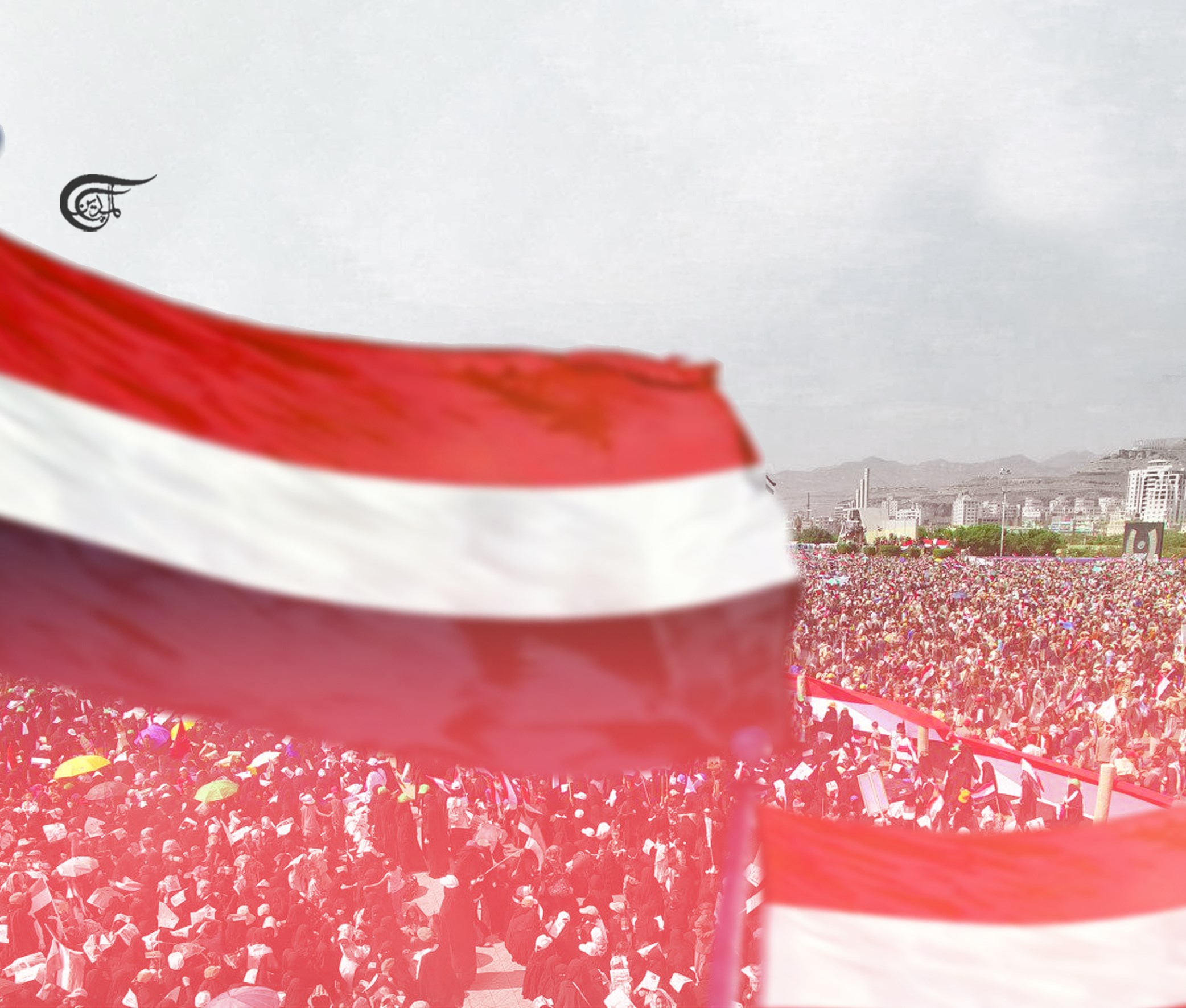How Yemen's September 21 uprising exposed Western media bias
On the Revolution's 8th anniversary, Yemenis remember the historical moments when the Minister of Interior announced that "Ansar Allah are friends of police" who should cooperate to protect private and public properties.
When Ansar Allah movement decided to support Yemenis angered by the Saudi-backed warlord Ali Mohsen Al-Ahmer for using force against peaceful protesters demanding the overthrow of the Western-backed government over the removal of fuel subsidies, Western media failed to report that the Minister of Interior called on soldiers to consider Ansar Allah as "friends of police," following the defeat of Al-Ahmer in Sanaa on September 21, 2014.
In a media blackout, no English outlet reported the remarks of Major General Abdo Hussein Al-Tarib, the Interior Minister, who gave a statement that was published in Arabic by the state-run Saba news agency.
Ahmed Al-Qudaimi, a journalism student at Sanaa University, said the Western media outlets like the Washington Post, AP, Reuters, and AFP are not independent but belong to companies owned by the governments.
Al-Qudaimi said, “Not publishing what the Interior Minister said is a news blackout perpetrated by media outlets that claim independence, yet, in fact, they belong to private companies owned by Western governments."
"Media coverage of the war in Yemen is in favor of the Hadi government backed by governments where these outlets are based", Al-Qudaimi told Al Mayadeen English in an interview at Sanaa University.
"If these outlets are independent as claimed, I challenge them to call 'Houthis' by their official name 'Ansar Allah' just as the United Nations calls them. However, these outlets call Ansar Allah Houthis to demonize them as their governments do in a flagrant and biased stand that reflects demonization."
"Therefore, these outlets are a tool used by their governments to demonize Ansarullah for they are against Western governments", explained Al-Qudaimi.
Media bias, disinformation
Al-Qudaimi said western outlets have been influenced by international public opinion because of the biased coverage of events in Yemen, so they became a mouthpiece for the Western government's foreign policy.
Western media didn't only practice media blackout by not reporting the moments when Yemenis celebrated this decision on September 2, but they also went on to describe this event as a ‘coup’ that ended in the resignation of Mohammed Basindawa's government on September 21.
"This is disinformation. Since when is forcing a government to resign a ‘coup’ while the president is still in the presidential palace? Observing Yemeni parties signing a UN-brokered Peace and Partnership Agreement on September 21?", said Al-Qudaimi. "The real ‘coup’ is when the Saudi-backed warlord fought Ansar Allah alone while President Hadi and his Defense Minister refused to back his fight against them."
Following Ansar Allah's success in forcing the government to resign on September 21, 2014, they signed the same day a UN-brokered "Peace, National Partnership Agreement" that was welcomed by UN Secretary-General, and Hadi oversaw the signing ceremony.
However, Hadi left Yemen after he launched a coup against himself by resigning in January 2015, which was refused by Ansar Allah, but when he refused to backtrack, Ansar Allah made a constitutional declaration appointing a revolutionary committee to fill in the power vacuum in February 2015.
After that, Hadi decided to flee Sanaa to Aden, saying he was still the president, before fleeing to Saudi Arabia. On the same day, the Kingdom launched its aggression on Yemen on March 26, 2015.
"The West does not want peace at all. They want to launch a media, economic, and military war against Yemen. However, when being defeated by Ansar Allah, they say we want peace and we are backing UN efforts to end the war in Yemen."
"If the West wants peace and a political solution, why did they order their backed parties in Yemen to withdraw from the UN-brokered Peace and Partnership Agreement," Al-Qudaimi told Al Mayadeen English.
'Oppressor, dictator'
After the fall of the former military base of Al-Ahmer, which was the only military base that stood against Ansar Allah forces entering Sanaa, Al-Ahmer forces were finally defeated, after which he left the base and headed to the Saudi Embassy in Sanaa in a secret and complex operation.
Later, in September of the same year, Ansar Allah called the base from the First Armored Division to September 21 Park.
Radhwan Al-Zuhairi, 32, who has been working at Al-Khair Grocery, said “Al-Ahmer has a bad reputation in Yemen."
"Al-Ahmer was a thug and a thief who didn't give others their rights," Al-Zuhairi told Al Mayadeen English at his grocery. "On September 21, we left this home when we heard the first bullet; only my brother remained to guard it against snipers storming it."
How Al-Ahmer fled to Saudi Arabia remained unknown until the Saudi Ambassador to Yemen Mohammed Al-Jaber revealed it in an interview in 2018.
Al-Jaber said Al-Ahmer arrived at the Saudi Embassy in Sanaa, asking for protection, after fleeing the base. Al-Jaber said he put a plan to smuggle Al-Ahmer via a helicopter that arrived at the Presidential Palace in Sanaa to transport him, disguised as the "wife of the Saudi ambassador."
"Al-Ahmer fled wearing 'Sharshaf'," said Al-Zuhairi, using the colloquial Arabic word for niqab. "It was the only way for him to avoid being killed by angry Yemenis whom he oppressed for years to satisfy the Saudis."
"The entire family members of Al-Ahmer are servants of Saudi Arabia in Yemen. They were generals in the army and tribal leaders but at the end of the month, they were receiving salaries from the Kingdom in violation of Yemen's law."
"I felt warmth when I received reports of Al-Ahmer fleeing the capital Sanaa because he was an oppressor and a dictator," said Al-Zuhairi.
"An insult"
Abdullah Abdul-Khaleq from Bani Matar District in Sanaa, who works as a taxi driver on the road between Sanaa University and Shamlan Area, said he was not able to park his taxi off the Gate before Al-Ahmer was forced to flee Sanaa on September 21.
"September 21 is the best day of my life," Abdul-Khaleq told Al Mayadeen English from inside his parked taxi off the southern main Gate of the base. "It was impossible for me to park my taxi here while Al-Ahmer was inside."
"It was a shame for the general to rule Yemen for over 50 years and in the end, his military base fell within hours, and he fled Yemen to Saudi Arabia.”
"The insult was not in being defeated but in all what was said in the Saudi media about how they deported Al-Ahmer on a helicopter, disguised as 'the wife of the ambassador,'" Abdul-Khaleq told Al Mayadeen English.
'Agent of Saudi intelligence'
Colonel Ali Al-Ja'adabi, whose house was only 50 meters southeast of the former base, recalled the September 21 event with sorrow for he lost two neighbors to a mortar shell.
"I fled my neighborhood after Al-Ahmer militias fired mortars at my neighborhood. We all thought that Ansarullah snipers were located over our buildings to surround the base," Al-Ja'adabi told Al Mayadeen English. "Two people were martyred in my neighborhood when the mortar hit the street they were passing in."
"I don’t know Al-Ahmer face to face, but whoever knew him said he was a dictator, a thief, and a warlord," said Al-Ja'adabi.
"He was the agent of Saudi intelligence in Yemen and it was quite obvious that he would flee to the Saudi Embassy. But Ansar Allah should have closed the [Saudi] embassy before storming the military base."

 Naseh Shaker
Naseh Shaker
 7 Min Read
7 Min Read











